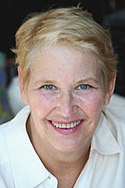Annie Dillard Quote
Three days a week she helped at the Manor Nursing Home, where people proved their keenness by reciting received analyses of current events. All the Manor residents watched television day and night, informed to the eyeballs like everyone else and rushed for time, toward what end no one asked. Their cupidity and self-love were no worse than anyone else's, but their many experiences' having taught them so little irked Lou. One hated tourists, another southerners; another despised immigrants. Even dying, they still held themselves in highest regard. Lou would have to watch herself. For this way of thinking began to look like human nature--as if each person of two or three billion would spend his last vital drop to sustain his self-importance.
Three days a week she helped at the Manor Nursing Home, where people proved their keenness by reciting received analyses of current events. All the Manor residents watched television day and night, informed to the eyeballs like everyone else and rushed for time, toward what end no one asked. Their cupidity and self-love were no worse than anyone else's, but their many experiences' having taught them so little irked Lou. One hated tourists, another southerners; another despised immigrants. Even dying, they still held themselves in highest regard. Lou would have to watch herself. For this way of thinking began to look like human nature--as if each person of two or three billion would spend his last vital drop to sustain his self-importance.
Related Quotes
About Annie Dillard
